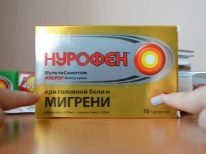"Nurofen" during pregnancy: instructions for use
"Nurofen" is an effective anti-inflammatory drug, which has a strong analgesic effect and the ability to reduce the temperature during its rise, so it is often included in the home first-aid kit.
It is in demand for headaches, the first symptoms of a cold and flu, and in many other cases. However, during pregnancy, it is impossible to drink such medicine without medical supervision, and in some cases, this medicine may harm the baby in the womb or cause problems during childbirth.
Features of application on different terms
When the expectant mother is experiencing pain or fever (for example, she has a toothache, an ear has inflamed, or an ARVI has started), such painful symptoms should not be ignored. The disease can affect the condition of the mother and affect the fetus. For example, during fever a baby in the abdomen can receive less oxygen, which will negatively affect its development. And the use of drugs from the group of non-steroid drugs, to which Nurofen belongs, is sometimes justified.
The instruction to the drug notes that taking Nurofen when carrying a child is undesirable, but short term treatment will not cause harm in the 2nd trimester.
But since the active substance of the drug can sometimes still provoke the appearance of pathologies in the fetus, then it is permissible to use this drug only when the future mother’s illness is more dangerous than the possible risk of Nurofen. This is the recommendation given by doctors regarding the second trimester of pregnancy, which is called the safest for the baby.
But in the early stages of treatment, Nurofen should be abandoned whenever possible. This medicine can disrupt the laying of organs and cause congenital abnormalities, so you should not use it in 1 trimester.
If the pain can be tolerated or the temperature has risen slightly, it is preferable to folk remedies, for example, a cool compress, tea with chamomile or raspberry. With severe pain and a rise in temperature above 38.5 degrees in the first trimester, “Nurofen” can be taken only in isolated cases after consulting a doctor, but it is better to replace it with a drug with a more benign effect.
As for the 3rd trimester, in the later periods the reception of "Nurofen" is strictly prohibited. Such medicine, taken later than the 28th week of gestation, can adversely affect the condition of the child (for example, cause heart disease), and the contractility of the uterus, which will lead to a late onset of labor and weak labor.
Release form and dosage
Nurofen is represented by a fairly large range of medicines, which differ in their form, composition, and amount of ibuprofen, the main ingredient of each of these drugs. The choice of the appropriate type of “Nurofen” depends on the reason for its use, for example, if the expectant mother has sore joints, it is better to use an ointment, and if you have a toothache, you should write a suspension or tablets.
Gel application
Such "Nurofen" is a colorless transparent mass, which has a peculiar aroma. It is sold in tubes containing from 30 to 200 grams of medication, and contains 5% ibuprofen.The drug is in demand for pain and inflammation in the muscles, back or joints. It is applied on a stretched, injured or inflamed area, and is also used for neuralgia. Since this gel acts only locally, it has no side effects and is relatively safe for the fetus. But to use such a drug without the supervision of a physician should not be, because it is contraindicated in children under 14 years of age.
A small strip of the product (from 4 to 10 cm) is rubbed into the desired area, and then hands are thoroughly washed. Treatment of infected skin is prohibited, as well as open wounds. Reapply the drug can be after 4 hours, and the frequency of use per day should not be more than 4 times. It is permissible to use Nurofen gel for up to 2 weeks, but it is also important to clarify this point with the doctor.
Children's release forms
This series of drugs called "Nurofen for children" is sold in orange-yellow packaging and is intended for children (except tablets, they are used from 3 months). Many future mothers They consider such drugs safer compared to Nurofen for adults, so they are chosen when carrying a child. However, the active substance in them is the same, so the effect on both the mother’s body and the fetus will be the same. The difference is only in dosages.
Children's "Nurofen" is represented by such species.
- Candlesthat are used rectally. Each suppository contains only 60 mg of the active ingredient; therefore, such Nurofen is not prescribed for adults.
- Pillscovered with a dense shell. The dosage of ibuprofen in each of them is 200 mg, which corresponds to the dose in tablets for adults, so children’s tablets do not have any advantages.
- A suspension which has an orange or strawberry flavor. This type of drug, sometimes called syrup, can be used during pregnancy, and its dosage is calculated by the weight of the woman. This "Nurofen" really has an advantage over pills - the expectant mother can take a dose of less than 200 mg if it is sufficient for a therapeutic effect.
It is recommended to take children's drugs after meals, so that such medicine irritates the digestive tract less. Drink the suspension or tablet should be at intervals of at least six hours, a maximum of three times a day and no longer than three days in a row. If the drug did not help get rid of the pain or did not lower the temperature, you should definitely consult with your doctor.
Pills
This form of the drug is most in demand in expectant mothers, because the size of the tablets is small, it is easy to swallow them, and one piece contains sufficient dosage for an adult patient. In the pharmacy, you can find the tablets "Nurofen" in a silvery pack. This drug, as noted above, has exactly the same properties as the tablets for children.
This medication contains 200 mg of ibuprofen per pill and is often prescribed for both pain and fever. It is taken with meals 1-2 tablets, washed down with water, with an interval of 6 to 8 hours, and the daily dosage of the drug should not exceed 1200 mg. The use of such a drug should be short-term - no more than 2-3 days.
In addition to the usual "Nurofen", tablets release more such drugs.
- "Nurofen Forte". The drug has a doubled dosage of ibuprofen (400 mg) and is taken 1 tablet up to 3 times a day.
- Nurofen Express Neo. In this variant of the tablets faster action, as they ibuprofen is presented in a special form, which is quickly absorbed (sodium dihydrate). The dosage per 1 tablet in terms of ibuprofen - 200 mg.
- "Nurofen Express Lady". Such tablets also act faster than normal Nurofen due to the presence of sodium ibuprofen dihydrate, but contain it at a dose of 400 mg (in terms of pure ibuprofen).
- "Nurofen Long." A feature of these pills is the presence of an additional analgesic and antipyretic component - paracetamol. The dosage of ibuprofen is 200 mg, and the amount of paracetamol in each tablet is 500 mg.
- "Nurofen Multisimpt". This type of tablet also includes a combination of ibuprofen and paracetamol, but their doses, respectively, are 400 and 325 mg. Both medications are allowed in 1-2 trimesters, but only under the supervision of a physician.
There is also a drug called "Nurofen Plus", but it is contraindicated at any gestational age due to the presence of the second active ingredient, which is codeine.
Capsules
They are more commonly used for headaches, neuralgia, toothache, migraines, or back pains, but can be used with a feverish condition. In this form, three medicines Nurofen are produced:
- "Express" - contains 200 mg of active ingredient in each capsule;
- Express Forte - dosage increased to 400 mg per capsule;
- "UltraKap Forte" - the dose in one capsule is 400 mg.
The main difference of any kind of medicine in capsules is the speed of action. It is connected with the fact that inside the gelatinous shell there is a liquid in which ibuprofen is dissolved.
Once in the stomach, gelatin quickly dissolves, after which the active substance immediately begins to be absorbed. Its maximum amount in the blood is observed already after 30-40 minutes, which is twice as fast as when absorbed from conventional tablets.
The therapeutic effects of the capsules begin to appear 15-20 minutes after they are taken. Single dose and frequency of use of such "Nurofen" coincide with the features of the use of tablets.
Possible harm
Even if the expectant mother takes Nurofen in the second trimester and the risk to the fetus is minimal, the drug can still harm a woman’s body.
- If a pregnant woman has any contraindications for taking such medication. These include hypersensitivity, bronchial asthma, gastric ulcer, severe renal failure, hemophilia, and many other diseases.
- If the expectant mother is already taking other drugs that are incompatible with Nurofen. This medicine should not be administered together with cardiac glycosides, anticoagulants, certain antibiotics, antacids, and other drugs noted in the annotation.
- If a woman exceeds the dosage or drinks "Nurofen" more often than is acceptable. In such a situation, various negative symptoms may appear, for example, headaches, diarrhea, signs of liver damage, drowsiness, and so on.
In addition, while taking Nurofen, side effects of such a drug can also occur, for example:
- skin rash;
- heartburn;
- bronchospasm;
- runny nose;
- weakness;
- stomach ache;
- bleeding from the nose;
- swelling;
- flatulence and others.
When they appear, the further use of Nurofen should be abandoned and consult with a doctor about which symptomatic remedy to replace it.
Analogs
Instead of "Nurofen", the expectant mother in the first and second trimesters can use as other drugs with the same active substance ("Ibuprofen-Akrikhin", "Mig 400", "Ibufen", "Faspik", "Ibuprofen", etc.), so and drugs, which additionally include paracetamol (“Brustan”, “Ibuklin”, “Next” and others). If fever or pain occurs in the third trimester, Nurofen is advised to replace with any of the paracetamol preparations.
findings
Although Nurofen has quite a few contraindications and there is a certain risk for the baby in the womb, this medicine is sometimes used during pregnancy. Usually these are isolated cases, and the reception itself is short-lived. Negative consequences, judging by the reviews, most often occur with uncontrolled use, the use of high doses or a very long reception.
Therefore, if the expectant mother is faced with the need to drink "Nurofen", you first need to discuss with your doctor a possible alternative and only if the doctor is convinced of the need for this medication, a pregnant woman can take a pill, capsule or suspension, but it is important to follow all his instructions.In this case, the harm from the drug will not.
More information about the drug can be found in the video below.





























